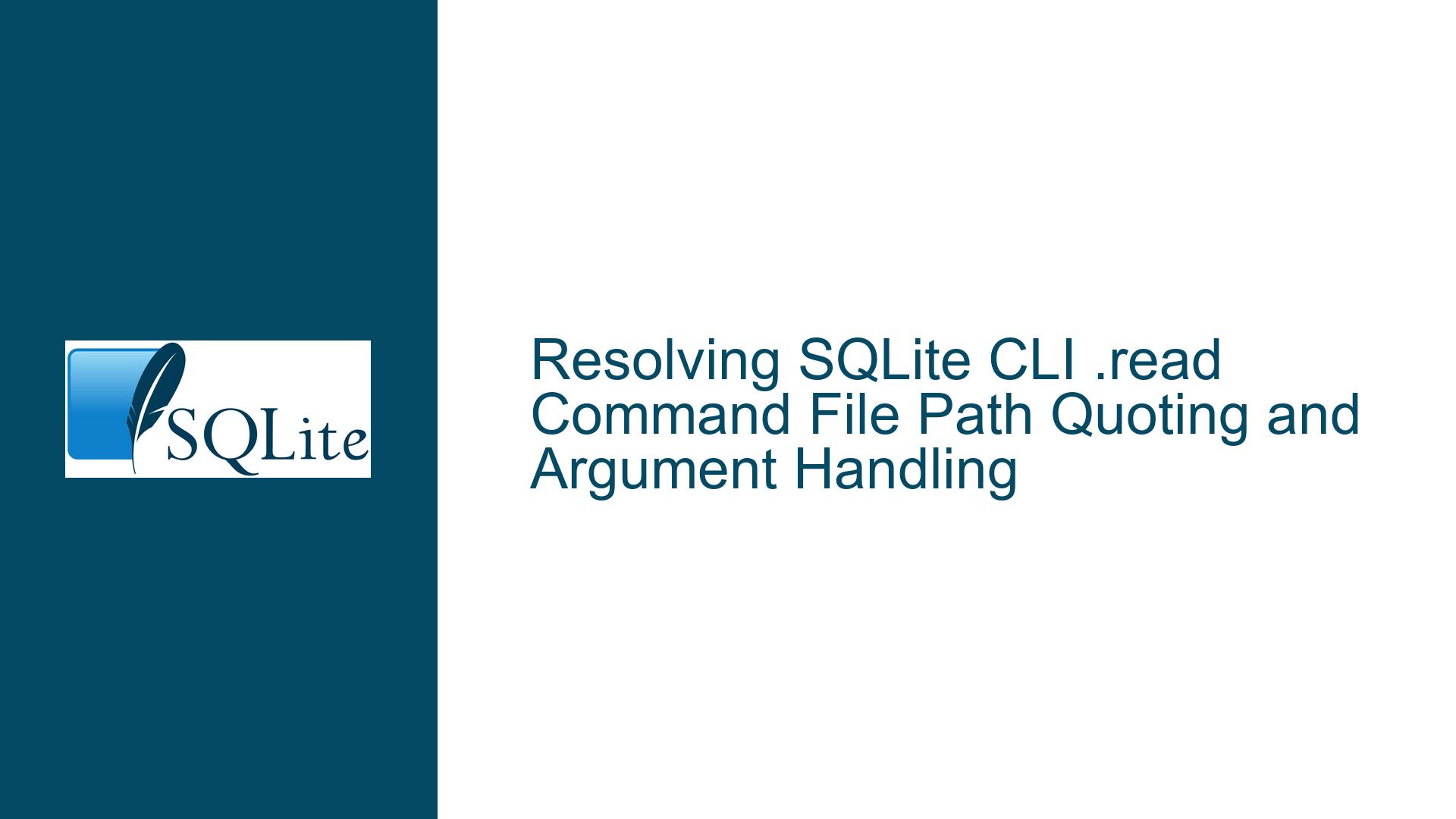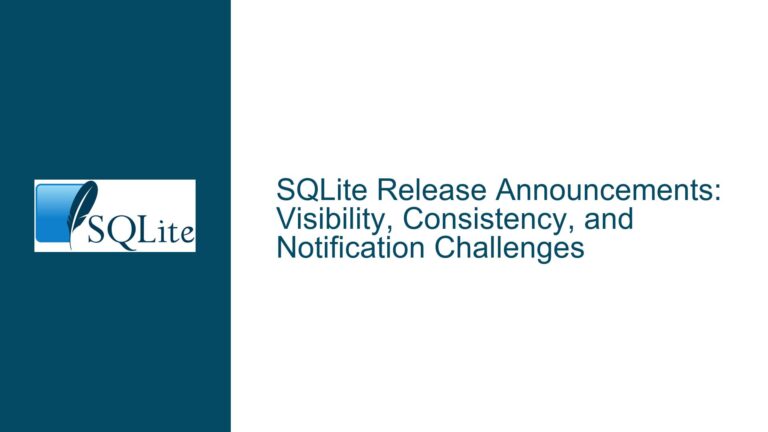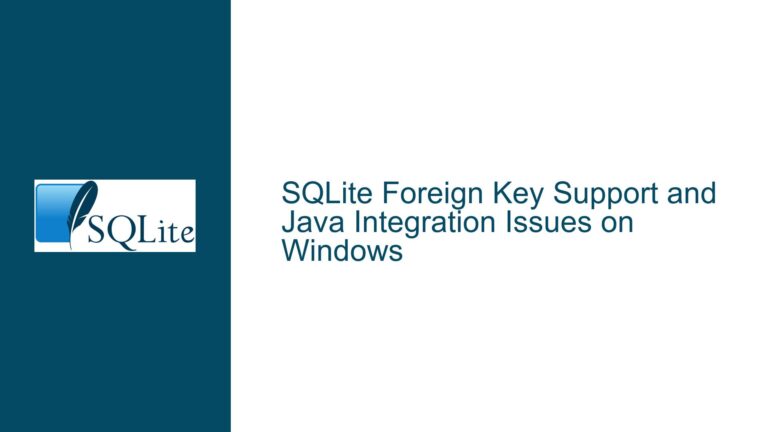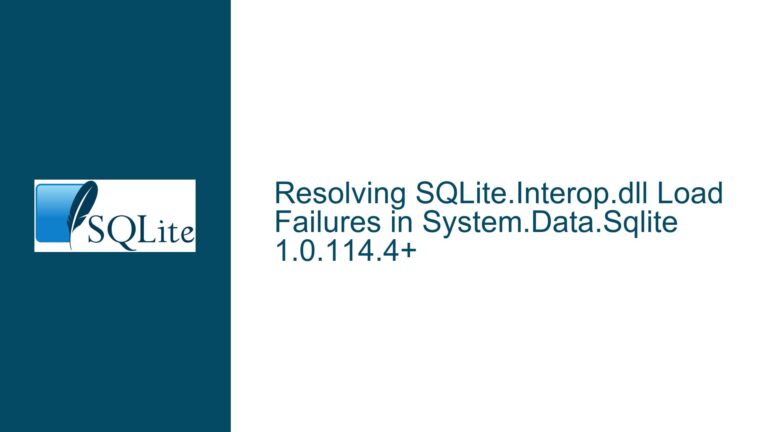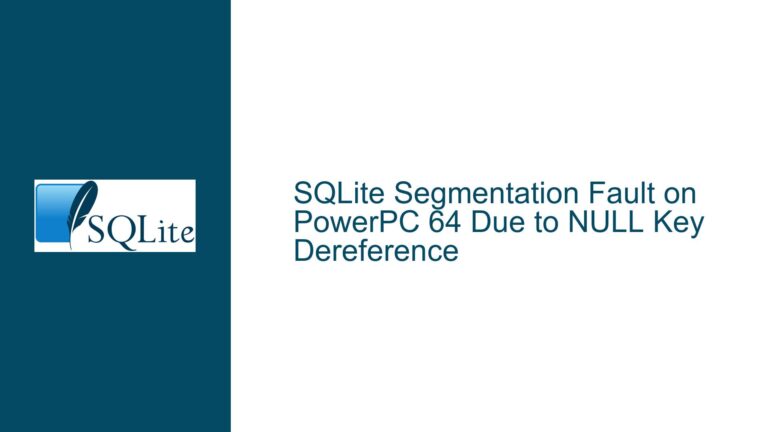Resolving SQLite CLI .read Command File Path Quoting and Argument Handling
Issue Overview: Syntax Errors When Reading Script Files via SQLite CLI .read Command
The SQLite Command Line Interface (CLI) provides the .read command to execute SQL statements stored in external files. However, users may encounter errors such as Usage: .read FILE when attempting to read output from external scripts or batch files, particularly on Windows systems. This issue arises when the .read command’s argument—a file path or a pipeline to an external program—is not properly formatted to account for spaces in filenames, command-line arguments, or shell-specific parsing rules. The core challenge involves understanding how the SQLite CLI interprets the argument passed to .read, especially when the argument includes special characters (e.g., spaces, pipes) or requires invoking external programs with parameters.
For example, a command such as .read |myscript.bat may fail with a usage error because the CLI parser misinterprets the argument’s structure. Similarly, scripts with spaces in their filenames (e.g., my script.bat) or scripts requiring arguments (e.g., myscript.bat Smith) demand precise quoting and escaping to ensure the CLI processes the command correctly. These errors stem from discrepancies between how the SQLite CLI parses the .read command’s argument and how the host operating system’s shell handles file paths and command invocations.
Possible Causes: Misinterpretation of File Paths, Pipeline Syntax, and Shell-Specific Parsing
Missing or Incorrect Quoting for File Paths with Spaces
When a script filename contains spaces (e.g.,my script.bat), the SQLite CLI splits the unquoted argument at the space, treatingmyandscript.batas separate entities. This violates the.readcommand’s expectation of a single file path or pipeline directive. Without proper quoting, the CLI attempts to open a file namedmy, which does not exist, triggering theUsage: .read FILEerror.Improper Handling of Pipeline Syntax
The.readcommand supports reading input from the output of external programs by prefixing the command with a pipe character (|). For example,.read |myscript.batinstructs SQLite to executemyscript.batand read its output as SQL commands. However, the pipe character and subsequent command must be passed as a single argument to.read. If the shell or CLI parser splits the pipeline into multiple tokens (e.g., treating|myscript.batas two separate arguments), the command fails.Inconsistent Argument Escaping Across Shell Environments
Windows shells (e.g.,cmd.exe, PowerShell) and Unix-like shells (e.g.,bash) handle quoting and escaping differently. A command that works in one environment may fail in another due to variations in how quotes and special characters are processed. For instance, Windows often requires double quotes for file paths with spaces, while SQLite’s CLI expects single quotes to encapsulate arguments containing spaces or pipes.Unescaped or Misordered Script Arguments
When passing arguments to a script invoked via.read '|myscript.bat arg1 arg2', improper ordering or quoting of the arguments can cause the script to receive malformed parameters or the CLI to misinterpret the entire pipeline directive. For example,.read '|my script.bat Smith'may fail if the space betweenmyandscript.batis not adequately quoted, leading the CLI to treatmyas a separate argument.
Troubleshooting Steps, Solutions & Fixes: Proper Quoting, Syntax Adjustments, and Shell-Specific Considerations
1. Basic Syntax Correction for Pipeline Commands
The .read command requires the pipeline directive (e.g., |myscript.bat) to be passed as a single argument. On Windows, wrap the entire pipeline in single quotes to prevent the shell from splitting the argument:
.read '|myscript.bat'
This ensures the SQLite CLI receives |myscript.bat as one token. If the script filename contains spaces, use double quotes inside the single quotes to encapsulate the path:
.read '|"my script.bat"'
Here, the outer single quotes instruct SQLite to treat the entire string as a single argument, while the inner double quotes satisfy Windows’ requirement for quoting paths with spaces.
2. Passing Arguments to External Scripts
To pass arguments to a script (e.g., myscript.bat Smith), include them after the quoted script path:
.read '|"my script.bat" Smith'
The CLI will execute my script.bat with Smith as its first argument. Ensure the script path and arguments are contained within the single-quoted string to avoid misinterpretation.
3. Handling Complex Filenames and Nested Quotes
For scripts with highly complex names (e.g., containing apostrophes or additional spaces), use a combination of quoting and escaping tailored to the host shell. In Windows cmd.exe:
.read '|"my ''complicated'' script.bat" "argument with space"'
Here, '' represents a single apostrophe within the filename, and the entire script path is double-quoted inside the SQLite single-quoted argument.
4. Validation in Different Shell Environments
Test the command in the target shell to identify parsing discrepancies. For PowerShell, which treats single quotes as literal delimiters, the command:
.read '|"my script.bat"'
should work as intended. In Unix-like environments using bash, replace double quotes with single quotes or escape spaces with backslashes:
.read '|my\ script.bat'
5. Debugging with Echo or Logging
Temporarily modify the script (myscript.bat) to echo its arguments or log its execution. For example:
@echo off
echo Arguments received: %* >C:\temp\script.log
Run the .read command and inspect the log to verify the script received the correct arguments.
6. Alternative Approach: Wrapping in a Helper Script
If persistent quoting issues arise, create a helper script (runner.bat) that invokes the target script with proper quoting:
@echo off
call "my script.bat" %*
Then use:
.read '|runner.bat Smith'
This delegates argument parsing to the helper script, simplifying the .read command.
By systematically applying these quoting strategies and validating the CLI’s interaction with the host shell, users can resolve .read command errors and ensure robust execution of external scripts.
